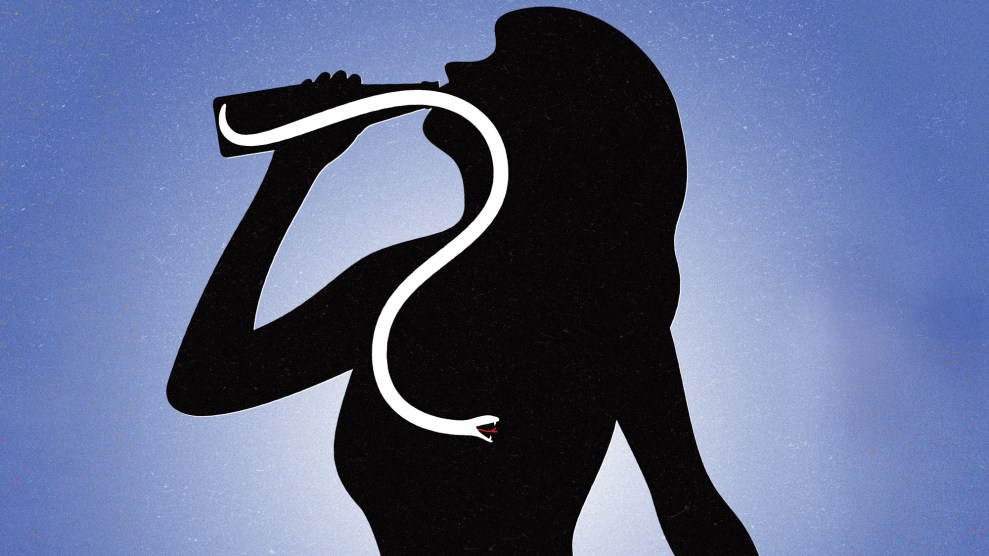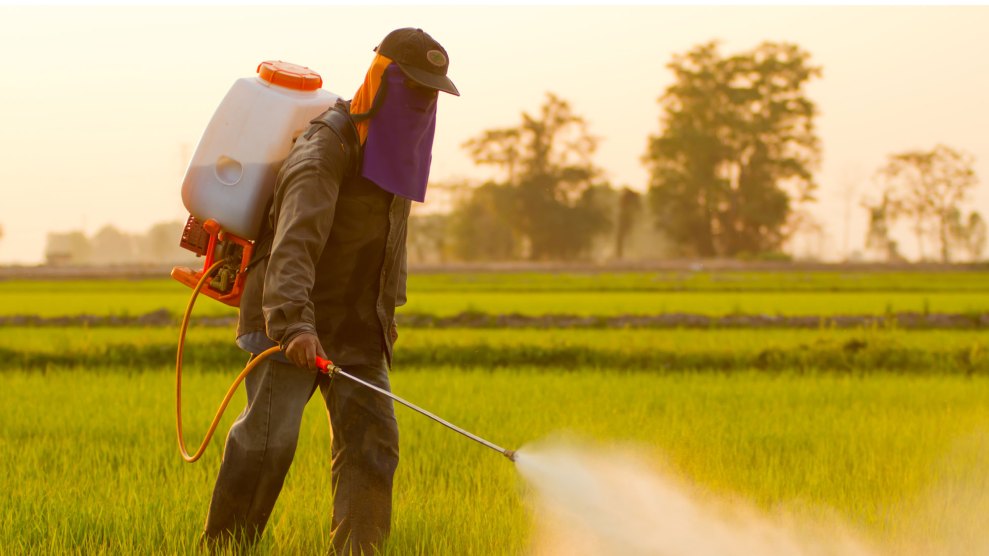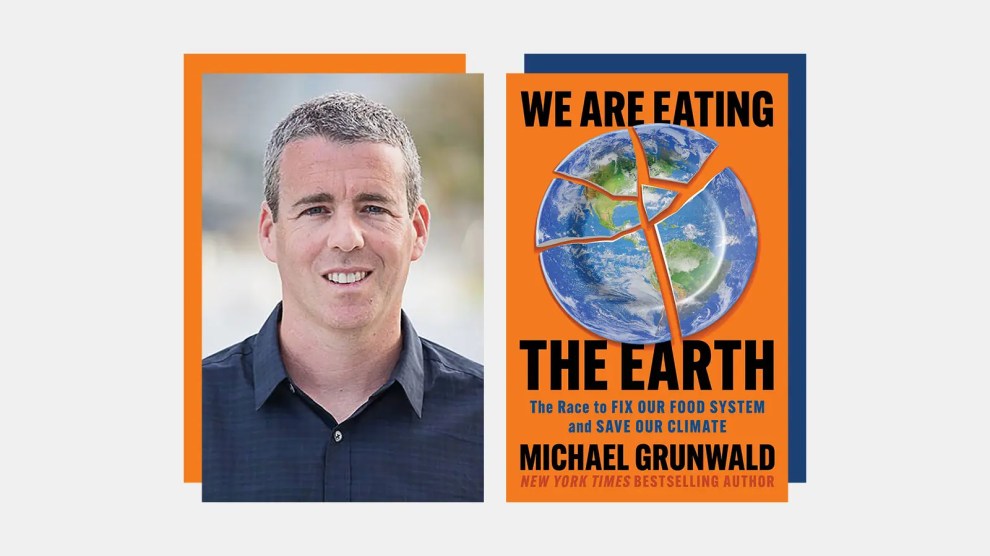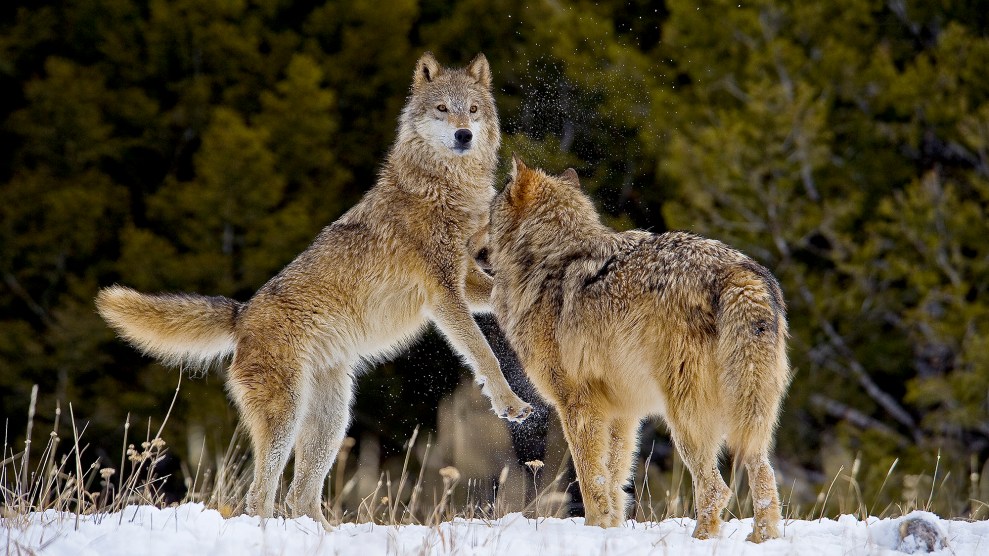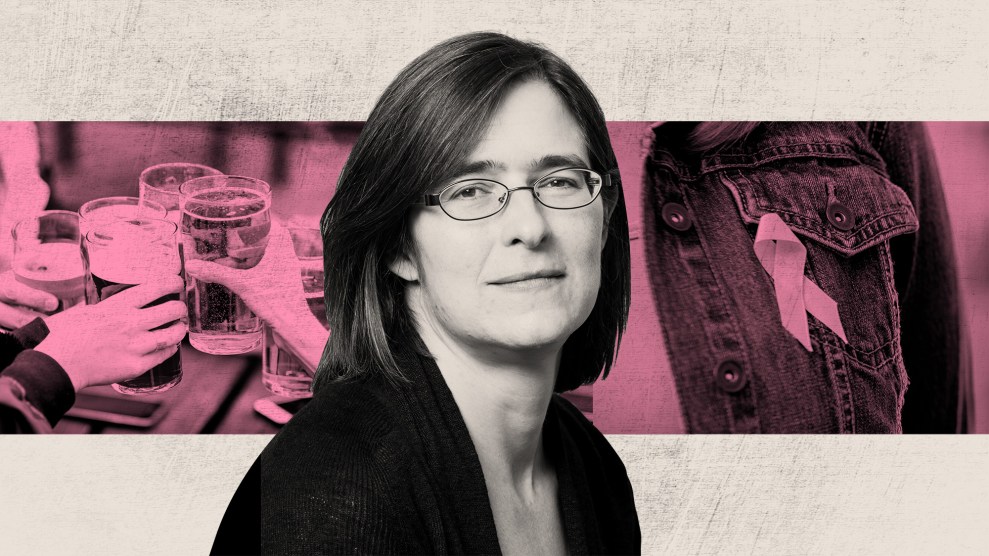
Mother Jones; Getty Images
Alcohol can cause cancer. That’s the takeaway from Mother Jones senior reporter Stephanie Mencimer’s blockbuster piece that weaves together her own breast cancer diagnosis and the disturbing history of the alcohol industry downplaying the carcinogenic effects of drinking. For Bite podcast, host Kiera Butler caught up with Stephanie to talk about drinking during her teen years in Utah, how the liquor industry courts women, and why doctors still aren’t warning patients about the dangers of booze.
Mother Jones: How did you discover the link between drinking and cancer?
Stephanie Mencimer: I was diagnosed with lobular invasive carcinoma in April last year, and it came as a bit of a shock. I don’t think anyone gets cancer and thinks, “Yeah, I saw that coming.” Being a journalist, I thought, “Well, I wonder why this is happening to me.” It wasn’t because I was angry or bitter or anything, but I was just curious to know where I fit in the bigger picture. What are the risk factors for this disease that I now have? I started just Googling, of course, and I looked at all the risk factors. I went down the list, and the biggest risk factor was age. The average age of a breast cancer diagnosis is 62.
That was a lot older than I was at the time. I didn’t think that was my risk factor. Taking hormone replacement therapy after menopause was also a big one, and I hadn’t hit menopause yet and had never taken those drugs. As I went through the list, there were a couple other things in there, like how early you start your period as a kid and how late you got to menopause and all that stuff. Then there was this one that really stuck out, and it was alcohol consumption.
I had no idea that alcohol was something that contributed to breast cancer. I was interested to know why I didn’t know. It wasn’t so much that I thought, “Oh, this has to be it. This is what caused my cancer.” I just wanted to know why I never found out about it until I got cancer and how is that possible. That’s what set me on the course of this research.
MJ: I think it’s really important to point out that the story that you wrote is not a health trends story. We’re so used to hearing, “Coffee is good for you. Now it’s bad for you. Eggs are bad for you. Now they’re good for you.” This is actually a case where there’s this really robust body of research over years and years that shows unequivocal results. What does the science say about the correlation between drinking and cancer right now?
SM: As you said, the science is really clear. There are more than 100 studies over [several decades] that all come to the same conclusion that alcohol contributes to breast cancer. It’s the most common cancer among women except for [skin] cancer. Alcohol contributes to about 15 percent of those [cases]. In real numbers, that’s quite a few, about 35,000 cases in a year.
There is a pretty clear biological mechanism for why alcohol is carcinogenic. It really does some pretty serious damage to the DNA in your cells, especially in places like your mouth where it can work with enzymes there to really mess up the cells and the DNA in your mouth and your esophagus. Then for breast cancer, there is a double whammy. Alcohol raises estrogen levels in the body, and estrogen weirdly enough is kind of carcinogenic. It causes the cells in your breast tissue to reproduce or replicate faster. That creates more opportunities for tumors to develop.
MJ: Your particular history of drinking got you thinking even more about this.
SM: I had my first beer when I was 13. Which is kind of weird because I grew up in Utah where people are known for not drinking. But I wasn’t Mormon, and the culture around being a non-Mormon in Utah involved lots of alcohol. The person who gave me my first beer was actually my dad. We were out pheasant hunting. I remember it really vividly, getting in the car, and it was cold outside. He was like, “Here, have a Mickey’s Big Mouth.” That was kind of the attitude that people had toward alcohol around me from a pretty young age. I can’t say that I continued to drink a lot of beer at 13, but by the time I was 15, in high school, we were drinking a lot.
Maybe everybody’s like that, but I think that we were trying as this non-Mormon group of kids to not be like the missionaries in Utah. We really pounded stuff, and it wasn’t really like the kind of social drinking that you do when you’re older. It was like, “Let’s mix a bunch of awful stuff from our parents’ liquor cabinets, whatever we can get a hold of, and pour it in, call it a Slurpee, and drink it with a straw.” That set off my years of drinking. I don’t know if I ever drank quite as much as I did when I was in high school when I was an adult. I thought about that when I got cancer and discovered that alcohol was a carcinogen and thought, “Wow, I’ve been exposed to this substance for a really long time.”
MJ: It sounds like from your piece that for women and breast cancer, that early drinking period is particularly important and particularly detrimental.
SM: Breast tissue doesn’t fully mature until a woman gets pregnant. You have a lot of cells that reproduce pretty quickly and robustly for those years, however long it is. If you never get pregnant, that in itself is a risk for breast cancer. There’s some evidence that suggests that it’s because those breast cells never mature fully, and it makes them really vulnerable to carcinogens.
Researchers had data from women who were exposed to radiation from the nuclear bomb in Nagasaki. Women who had been under the age of 20 who were exposed to radiation had way more breast cancer than women who were over 40. The researchers deduced that this was a vulnerable time for breast tissue for women. If you start drinking when you’re quite young before you’ve had children and doing a lot of it, actually, it can cause benign breast disease first, which I don’t think people really realize. Anyone who’s ever had to deal with a mammogram that involves dense breast tissue, well, alcohol can make that happen. Even though you don’t have cancer, it can still make it harder for mammograms to do their job to pick up on the tumors. It works in a whole bunch of insidious ways for younger women that I think is really powerful.
MJ: The most disturbing piece of this is that you found that the alcohol industry is actually working hard to downplay this science. Can you tell me a little more about that?
SM: Instead of talking about the risks that come along with alcohol, they have really pushed hard to market alcohol as a health product, which is kind of ironic. It’s a really audacious marketing strategy to take something that kills almost 90,000 people a year, and that includes cancer but like also car crashes and accidents and things like that, to take that and say, “Hey, this is actually something you should drink every day because it’s good for you, and it might protect you from heart disease or from dementia.”
MJ: And they’ve actually tried really hard to get women into drinking more.
SM: Per capita alcohol consumption in the United States peaked in about 1981 or 1982. The industry then really got hammered because there were a lot of drunk driving tests that came along with that. Public health people pushed back and passed a bunch of laws to enforce underage drinking laws, to raise the legal drinking limit to 21. There was a lot of fetal alcohol syndrome work back then in the ’80s, and it was pretty effective so that by the mid-’90s, per capita alcohol consumption in the US had really plummeted. I think by like ’97, you can see it’s a real dip. People really just weren’t drinking as much at that point.
The industry was trying to figure out what to do about it, because they were losing money. They’re not selling as many products, and so I think that what happened is they looked at the data. Historically, women have always drunk a lot less than men. We metabolize it differently. It affects us more. There’s just more of a culture of drinking, I think, for men than there was for women. The industry looked at all that and was like, “Wow, here’s a growth market.” They set about to really push drinking on women. They came up with products for them, special types of like alcopops, sweetened malt beverages. Because women, I guess historically, don’t like the taste of beer. They created these things they marketed to young women.
It was quite a concerted effort to get women to drink more like men, and it worked. Today, [teen] girls are more likely to drink than the boys are, and that’s true of college students, too.
MJ: You have this whole part of your story where you talk about when you were diagnosed, you were sent to go meet with a nutritionist who was going to give you this anti-cancer diet.
SM: That was one of the more depressing moments of my cancer treatment, when I learned all the things that I was supposed to do to keep it from coming back. This very nice nutritionist gave me a list of things that I should do and not do; I needed a spreadsheet to really keep track of it all. I was supposed to eat cruciferous vegetables four to five times a week. I was supposed to have tofu or some sort of natural soy three times a week. She wanted me to eat 30 grams of fiber a day, which is almost impossible to do even if you’re eating a lot of lettuce because it’s a really high number, so she said, “Beans, you have to eat all these beans in order to hit that target.”
After an hour of this conversation about all the ways I should modify my diet to fight cancer, not once did she ever bring up alcohol. I talked to an oncology researcher who said, “That’s really funny because there’s a lot more data about why you shouldn’t drink alcohol than there is about eating tofu or broccoli as part of your anti-cancer diet.”
MJ: How do we compare in the United States to other countries when it comes to how much people know about this connection between alcohol and cancer?
SM: Other countries are actually doing quite a bit more than we are. One of the most interesting things I’ve found was that when the tobacco wars were really heating up, there was money that went into campaigns to do counter-advertising to combat the tobacco industry’s marketing, especially toward young people. There were ads about smoking, like the Marlboro man coughing and dying of cancer and those sorts of things, and ads that showed what smoking really did to people to make it look less sexy to counter what the tobacco industry was doing.
In England, and also in Australia, some of the cancer groups there have started doing the same thing around alcohol. They’ve run some ads where there’s a great one where they have a guy drinking a beer, and in the bottom of the glass is a tumor. It shows him sipping away at this glass, and the narrator goes on about why alcohol causes cancer, and then the guy swallows the tumor. His little kids are running around in the background.
Here in the United States, cancer groups actually join up with the alcohol industry to raise money. I found a whole bunch of places, like at Georgetown Hospital here in D.C. They have a wine and women fundraiser for their Lombardi Cancer Center. Breast cancer especially—a lot of the charities raise money through craft brew events or wine events. That’s not happening so much overseas. Other countries are doing things that will help prevent cancer by reducing alcohol consumption, like really basic stuff like raising taxes on booze, which in the United States, not only have we not raised alcohol taxes in a really long time—in the tax bill this year, they just slashed them even further. Our alcohol taxes now are lower than they were in the 1950s.
MJ: What does the science say about men’s drinking and their cancer risk?
SM: Men don’t get off the hook on this one. Alcohol for men causes more than 50 percent of all mouth and lip and throat and esophageal cancer. It causes 16 percent of all colon cancer in men, and that’s the big one because there are a lot of colon cancers. Men don’t get breast cancer like women do, and because it’s hormone related, it’s not really such an issue for them, but it’s still a problem. Esophageal cancer isn’t that common, but it’s pretty astonishing that 50 to 55 percent of all those cancers are caused by drinking. I really don’t think people appreciate that, and it’s especially true for men.
MJ: One thing that as I talk about your piece with my friends and my colleagues, we can’t shake this chilling feeling that for many of us, the damage has already been done. For me, for example, I’m 38. I had my baby right before I turned 36, at which point I had been drinking alcohol since college. Even if I quit drinking right now, would it even have any effect on my cancer risk?
SM: There is good news on that front. It’s like smoking. If you quit, your risk starts to go down. There hasn’t been as much research on this, and I imagine this would be some place that people are going to start digging into now that it’s so clear that alcohol causes cancer. Your risk will definitely go down. If you figure that things like breast cancer don’t start to show up in people a lot of times till you’re 70 years old, that gives you another 30-some years of drinking that could still give you cancer.
I don’t think that anyone is really recommending prohibition or don’t drink at all, but the government recommendations and sober scientists, they’ll say, “If you don’t drink, don’t start, but if you do drink, you should stick to the guidelines,” which say that if you have only one drink a day or less, that you’re probably going to be fine. I think that we don’t all just live to prevent cancer. I don’t want to be a total killjoy. One drink a day probably isn’t going to make your life that much shorter, but don’t have seven drinks on Saturday. I think that if people stayed within that guideline, they’d be in pretty good shape. They’d certainly be better off than they are now.
MJ: Right. One of your sources was somebody who talks to college kids about the risks of binge drinking, and she observed that she would talk to these kids, and then she would see them going out that same night and getting wasted. It seems we need to change how we’re talking to our kids about it from a much earlier age.
SM: I think a big part of that is going to be up to the medical profession because in my experience, even going through cancer treatment—and I see my oncologist every three months—they just never talk about alcohol. Part of that is because the industry has really targeted doctors with the message that alcohol can reduce heart attacks. They distribute studies to doctors to make sure they see all that stuff about red wine, but the doctors really haven’t gotten the message that alcohol is carcinogenic.
Especially for young women, it’s such a big deal. I think that the American Society of Oncologists is trying to remedy this problem because they did a study about how few people really understand the risk of alcohol and cancer. They put out a paper saying, “Here’s all the evidence. Here’s why we need to talk to our patients about this.” They also said that one of the reasons that doctors don’t like to talk about it is that doctors like to drink. There are quite a few wine companies that are owned by doctors.
People will listen to their doctors, even if you’re a teenager or a college student. If your doctor says, “Look, this is going to give you breast cancer if you don’t cut way back,” I think that people are not stupid. They will take that into consideration and make some changes.
